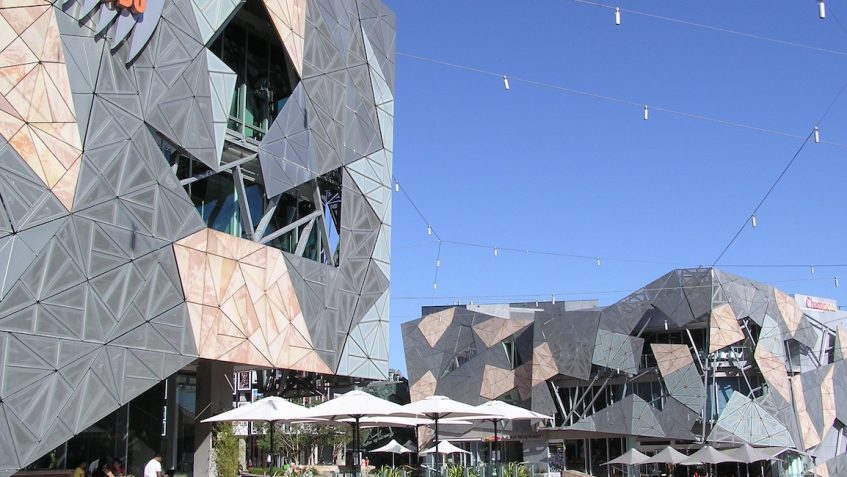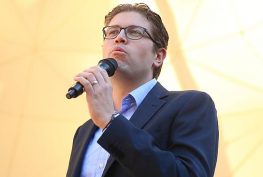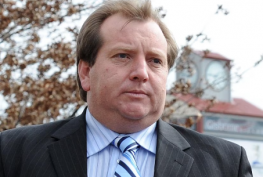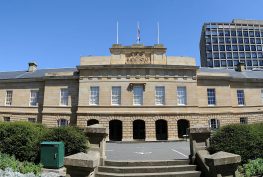WE CALL UPON ETHNIC LOBBYISTS TO STOP MEDDLING WITH THE EDITORIAL INTEGRITY OF SBS
Media plays a powerful role in shaping the public opinion. It is therefore important to highlight when lobbyists try meddling with the independence and editorial integrity of our public broadcasters.
George Rennie, a Lecturer at the University of Melbourne, specialises in lobbying and interest groups. Rennie points out to the threat of lobby groups on our democracy in a recent article on The Conversation:
“…The ability of powerful concentrated interests to drown out other voices in public debate, presents significant challenges for Australian democracy.”
For lobbyists, it is essential to use the most widely cited source of news in order to influence and shape public opinion in Australia, hence the recent unprecedent attacks on the independence and editorial integrity of SBS.
Concerned about this, newly appointed NSW Senator Kristina Keneally has put the question to the head of SBS, Michael Ebeid during senate estimates hearing. Here is a short excerpt transcript from that hearing:
Ms Keneally: Has the SBS ever been lobbied by any organisation to sensor its coverage or change its coverage of the Armenian genocide?
Mr Ebeid: I have been lobbied on many, many occasions by various people from the Armenian community. I have never in my seven years at SBS had a single meeting with anybody from the Turkish community to discuss anything around this issue. I’ve tried explaining that to many of our Armenian audiences and community members. They do have a false view that I’ve been lobbied by the Turkish community, which is absolutely false.
Powerful lobby groups remain a threat to our democracy.
SBS, like most respected international media outlets including Reuters, BBC, New York Times and Associated Press do not refer to the tragedy of Ottoman Armenians as genocide.
There is a reason for this common cross-boundary editorial position.
Firstly, unlike Srebrenica or Rwanda genocides, there is no court verdict by a competent international authority to label the events of 1915 as such. According to the European Court of Human Rights, genocide is a strictly defined legal term. The only tribunal set to investigate whether or not the Ottoman’s committed crimes against humanity, failed to deliver any verdict due to lack of evidence. The crown prosecutor advised the tribunal, any judgement would be nothing but political.
Secondly, the historical debate among the students of Ottoman history continues about the events of 1915.
No one denies the tragedy suffered by the Ottoman Armenians. The debate rages on about whether or not there was an intention to exterminate Armenian population, or it was a forced relocation operation that went wrong.
In fact, most prominent Middle East historian, the late Bernard Lewis once told media:
“There is clear evidence of a decision by the Turkish government to deport the Armenian population from sensitive areas, which meant virtually the whole of Anatolia not including the Arab provinces which were then part of the Ottoman Empire. THERE IS NO EVIDENCE OF A DECISION TO MASSACRE (Armenians), ON THE CONTRARY THERE IS CONSIDERABLE EVIDENCE OF ATTEMPTS TO PREVENT IT (by the Ottoman Turks)…the massacres carried out by irregulars, local villagers responding to what had happened to them (During Armenian revolts earlier) and number of other ways but to MAKE THIS PARALLEL TO THE HOLOCAUST IN GERMANY…SEEMS TO ME A RATHER ABSURD PARALLEL.”
Threats to our press freedom and independence, concerning events of over 100 years ago on another continent, are not conducive to an inclusive, multicultural and democratic Australian society.
List of historians and scholars who reject the “Armenian Genocide” narrative or who express views on historical events that are not congruent with this narrative (also contains those who have passed away)
- Alan Fisher, Professor of History, Michigan State University, East Lansing/Michigan/USA
- Alon Ben-Meir, Professor and Senior Fellow at New York University’s Center for Global Affairs and Senior Fellow at the World Policy Institute – Focuses on Middle East politics and affairs
- Andrew Mango (deceased), researcher, author, and historian – PhD in Persian Literature, School of Oriental and African Studies (SOAS), University of London.
- Armand Sag, Drs., Dutch scholar specializing in Turkish History – Chairman and Senior Researcher at Institute for Turkish Studies, Utrecht/The Netherlands
- Atahan Paşayev, Director of the Azerbaijani National Archive Administration
- Avigdor Levy, Professor of History, Brandeis University, Waltham/Massachusetts/USA
- Ayten Mustafayeva, PhD in Law from Baku State University, Azerbaijan National Academy of Sciences
- Bernard Lewis (deceased), Professor Emeritus, Near Eastern Studies, Princeton University – He was a highly recognized British-American historian specializing in Oriental Studies, and Ottoman and Turkish History
- Bertil Dunér, Senior Researcher, the Swedish Institute of International Affairs, Stockholm/Sweden
- Brendon J. Cannon, Assistant Professor at the Institute of International and Civil Security (IICS) at Khalifa University, Abu Dhabi/UAE.
- Brian Glyn Williams, Associate Professor of Islamic History at the University of Massachusetts, Dartmouth/Massachusetts/USA – PhD in Middle Eastern and Islamic Central Asian History. University of Wisconsin, Madison/ Wisconsin/USA
- Caroline F. Finkel, British historian and writer – PhD in Ottoman History from the School of Oriental and African Studies (SOAS), University of London
- Christian Johannes Henrich, Dr., former faculty member of the Research Center for South Europe and the Caucasus at Siegen University, Siegen/Germany
- Christopher Gunn, Assistant Professor of History, Coastal Carolina University, Conway/ South Carolina/USA
- Cornell Fischer, Assistant Professor of History, University of Chicago
- Dankwart A. Rustow (deceased), Professor of Political Science and Sociology at the Graduate Center of City the University of New York – Middle East expert
- Donald Cameron Watts (deceased), Professor at the London School of Economics and Political Science, Head of the International History Department
- Eberhard Jackel, Professor Emeritus of Modern World history, Stuttgart University, Germany – He has conducted comparative work on genocide and reached the conclusion that the Holocaust is unique
- Edward J. Erickson, retired US Army officer, former Professor of Military History at the Marine Corps Command & Staff College in Quantico, Virginia/USA – PhD in History with a specialization in Ottoman military history
- Elizabeth-Anne Wheal, she was a history scholar at Cambridge University
- Ezel Kural Shaw, Professor Emeritus of History at California State University, Northridge/California/USA
- Feroz Ahmad, Professor Emeritus of History at the University of Massachusetts, Boston/USA – member of the Department of Political Science and International Relations at Yeditepe University, Istanbul/Turkey
- Firuz Kazemzadeh (deceased), Professor at Yale University – MA from Stanford University, Ph.D. from Harvard University – Chairman of the Yale Committee for Middle East Studies (1979-1983) – Editor of World Order (1966-2000)
- Gilles Veinstein(deceased), Professor of Ottoman History at the Collège de France – Specialized in Turkish and Ottoman History
- Guenter Lewy, Professor Emeritus of Political Science at the University of Massachusetts Amherst, Amherst/USA
- Gwynne Dyer, historian and military journalist – PhD in Military and Middle Eastern History from King’s College London
- Halil Inalcik (deceased), Professor of Ottoman History & Member of the American Academy of Art & Sciences, University of Chicago – Department of History of Bilkent University, Ankara/Turkey
- Hasan Guliyev (deceased), , Institute of Philosophy and Political-Legal Studies at the Azerbaijan National Academy of Sciences – He was member of the editorial boards of several international scholarly publications with five fundamental works and over 50 articles
- Heath Ward Lowry, he was the Professor of Ottoman and Modern Turkish Studies at Princeton University
- Hew Strachan, Professor of International Relations at the University of St Andrews/Scotland/UK – Military historian, well known for his work on the administration of the British Army and the history of the First World War.
- Hikmet Özdemir, Professor of Political Science specializing in Turkish Political History – PhD in Political Science from Ankara University – author of many Turkish-language books concerning the Turkish-Armenian controversy
- Hüseyin Bağcı, Professor of International Relations at the Middle East Technical University (METU), Ankara/Turkey
- İlber Ortaylı, Professor of History at Bilkent University, Ankara and Galatasaray University, Istanbul
- C. Hurewitz (deceased), Professor and Former Director of the Middle East Institute, Columbia University
- Jean-Luis Mattei, French historian and author – Graduated from the Department of French Literature and Latin-Ancient Greek, Faculty of Letters and Human Sciences of Aix-en-Provence and earned his master’s degree from the same university – Worked as a specialist at the Department of French Language Teaching, Faculty of Education at the University of Uludağ, Bursa/Turkey – He has published works dealing with the Turkish-Armenian controversy
- Jeremy Salt, Australian retired journalist of Middle Eastern affairs and retired professor who taught courses on Middle East history and politics at Bilkent University (Ankara/Turkey) and the University of Melbourne Department of Political Science and Public Administration
- John Patrick Douglas Balfour (Lord Kinross) (deceased), he was a Scottish historian and writer well-known for his biography of Mustafa Kemal Atatürk and works focusing on history of Islam
- Justin A. McCarthy, demographer, Professor of History at the University of Louisville, in Louisville/KentuckyUSA
- Kalerya Antoninovna Bellova, she is a Russian Associate Professor at Moscow State Institute of International Relations
- Kamuran Gürün (deceased), former Turkish diplomat (BA from the Department of Political Science, Faculty of Political Sciences at Ankara University) and the author of The Armenian File: The Myth of Innocence Exposed
- Kemal Çiçek, Professor, MA and PhD from Ottoman Studies at Birmingham University, UK – He has many published works concerning the Turkish-Armenian controversy
- Kerim Kami Key, historian – MA in History, University California, Berkeley, PhD in History, American University, Washington D.C. – Specialized in the origins and development of Turkey – He spent his academic career giving courses on history, trade, and the Middle East in several American universities
- Hakan Yavuz, Professor, Department of Political Science at the University of Utah, USA
- Malcolm E. Yapp, Professor Emeritus, Modern History of Western Asia at the School of Oriental and African Studies (SOAS), University of London
- Mark Almond, writer and lecturer in History at Oxford University’s Oriel College
- Mary Schaeffer Conroy, Professor of Russian History, Colorado University, Denver/USA
- Matthew Lippman, Professor Emeritus, the Department of Criminology, Law and Justice, University of Illinois at Chicago (UIC)
- Maxime Gauin, French historian – MA in History from Paris-Sorbonne University – He is currently pursuing a PhD in History at the Middle East Technical University (METU), Ankara/Turkey – Scholar in Residence at the Center for Eurasian Studies (AVİM), Ankara/Turkey
- Mehmet Perinçek, Dr., Turkish historian and political scientist – PhD in History from Istanbul University – served as a research assistant at Istanbul University and as a guest research assistant at the Moscow State Institution of International Relations – has conducted significant research in Russian state archives about the First World War and Armenian insurrectionists’ activities in the Ottoman Empire
- Mesut Uyar, Military Historian – Professor of International Relations at Antalya Bilim University, Turkey – Worked as an Associate Professor of Ottoman Military History at the University of New South Wales, Canberra for five years – MA in Politics and PhD in International Relations, Istanbul University
- Metin Kunt, Professor of Ottoman History at the City University New York
- Metin Tamkoc, Professor of International Law & Relations, Texas Tech University, USA
- Michael E. Meeker, Anthropologist, Professor Emeritus, University of Washington – Ph.D. from University of Chicago
- Michael Gunter, Professor of Political Science, Tennessee Technical University, USA – PhD in International Relations, Kent State University, USA
- Michael Radu, Senior Fellow and Co-Chairman Center on Terrorism, Counter-Terrorism, and Homeland Security, Foreign Policy Research Institute (FPRI) – PhD in International Relations, Columbia University.
- Murat Bardakçı, Turkish journalist and historian
- Nedret Kuran Burçoğlu, Professor of Translation Studies & Comparative Literature, Yeditepe University, Istanbul/Turkey –
- Norman Itszkovitz, Professor of Near Eastern Studies, Princeton University
- Norman Stone, Professor Emeritus, Modern History at Oxford University and Director of the Center for Russian Studies at Bilkent University, Ankara/Turkey
- Nur Bilge Criss, Professor, retired faculty member of the Department of International Relations at Bilkent University, Ankara/Turkey – PhD in History, George Washington University, USA – Specialization: Modern history, Ottoman History, Turkish Foreign Policy, Contemporary History
- Oleg Yurievich Kuznetsov, Dr., Russian historian – Taught courses at the Tula State University, Law Institute of the Ministry of Justice of the Russian Federation, and FSB Moscow Border Institute – He has many published works on Russian history, Eastern Europe and Caucasia, Russian constitutional and criminal law, civil law and criminal law processes, international humanitarian law
- Olga Bykova, PhD candidate at Ural State University, Russia (Ural Federal University – UrFU) – Worked as a researcher at Istanbul University’s Institute of Ataturk’s Principles and History of Turkish Revolution and conducted research on the Turkish-Armenian controversy – Served as an instructor at Yeditepe University, Istanbul/Turkey – Gave lectures on Russian language and Russia’s history and culture.
- Ömer Engin Lütem (deceased) – Founder and Honorary President of the Center for Eurasian Studies (AVİM) – editor of Review of Armenian Studies and Ermeni Araştırmaları, two peer-reviewed journals on Armenian studies and the Turkish-Armenian controversy
- Oral Sander (deceased), Professor of Political Science, Ankara University
- Otto Winkelmann, Goethe University, Frankfurt/Germany
- Ozay Mehmet, Professor Emeritus, International Affairs (Economics), Carleton University, Ottawa/Canada
- Pat Walsh, Dr., Irish historian, focuses on Irish history and politics and the impact of the First World War on the UK and the Ottoman Empire, https://drpatwalsh.com/
- Paul Dumont, Director of the Turkish Studies Department of Marc-Bloch University of Strasbourg, France
- Paul Henze, Ph.D., Harvard University – Consultant for the Rand Corporation and the Smithsonian Institution
- Peter Golden, Professor of History, Rutgers University, Newark/New Jersey/USA
- Philip Stoddard, Executive Director, Middle East Institute, Washington D.C
- Philippe Fargues, Professor, American University, Cairo/Egypt – PhD in Sociology, Sorbonne University, France
- Rhoads Murphey, Professor Emeritus, Middle Eastern Languages & Cultures and History, Birmingham University, UK
- Robert Farrer Zeidner (deceased), was an American historian with a Ph.D. in Ottoman Military History from the University of Utah, Middle East Center
- Robert Mantran (deceased), was professor of Turkish studies at Aix-Marseille University and a member of the Institut de France
- Roderic Davison (deceased), Professor of History, George Washington University, Washington D.C.
- Sean Patrick Smyth, Irish researcher, MA in Turkish Studies at Leiden University, Leiden/the Netherlands
- Seçil Karal Akgün, Professor of International Relations, Middle East Technical University (METU), Ankara/Turkey – PhD from Ankara University – Focuses on late Ottoman history, contemporary Turkish history, historiography and approaches to the interpretation of history
- Şinasi Orel (deceased), Turkish military officer, bureaucrat, and diplomat – co-author of the book titled The Talat Pasha Telegrams: Historical Fact or Armenian Fiction? that concretely demonstrated the forged nature of the “Andonian documents” that were being frequently used support the Armenian Genocide narrative. Note: Sociologist Taner Akçam has alleged in his book Naim Efendi’nin Hatıratı ve Talat Paşa Telgrafları (an English version of this book was recently published titled Killing Orders: Talat Pasha’s Telegrams and the Armenian Genocide) that the “Andonian documents” are, in fact, authentic. However, Akçam’s book has been demonstrated to rely on serious distortions and false assertions (see: Review of Armenian Studies, Issue 34, pages 129-156, http://avim.org.tr/tr/Dergiler/Review-Of-Armenian-Studies)
- Sohret (Shohrat) Barlas, Uzbek historian and author of “Turkestan and South Caucasus XIX–XX centuries. Dashnaks – From Karabakh to Faragana”
- Stanford Jay Shaw (deceased), Emeritus Professor of Turkish and Judeo-Turkish History, University of California, Los Angeles/USA – best known for his works on the late Ottoman Empire, Turkish Jews, and the early days of the Republic of Turkey
- Stephen Blank, Professor at the US Army War College’s Strategic Studies Institute
- Stephen Kinzer, American author, journalist and academic – Senior Fellow in International and Public Affairs at the Watson Institute of Brown University
- Stephen Pope, former modern history scholar at Oxford who has authored four well-received reference books dealing with history
- Süreyya Yuca, co-author of the book titled The Talat Pasha Telegrams: Historical Fact or Armenian Fiction? (see the entry for Şinasi Orel for additional information)
- Tal Buenos, Israeli researcher – MA in Theological Studies from Harvard Divinity School, currently a Ph.D. candidate in Political Science at the University of Utah, USA
- Thierry Zarcone, Director of Research at the National Center for Scientific Research, Paris – Expert of the Office for Democratic Institutions and Human Rights (OSCE) – former visiting professor at Kyoto University, Japan
- William Leonard Langer (deceased), Professor of History, Harvard University – specialized in the Ottoman Empire, Near East, and Russia – served as the Chief of the Research and Analysis branch of the Office of Strategic Services (OSS) and Assistant Director of the Central Intelligence Agency
- Yitzchak Kerem, Professor of History, Hebrew University of Jerusalem – specializes in Sephardic Jewry – served as the section editor for Encyclopedia of the Holocaust and New Encyclopedia Judaica – Founder and Director of Institute for Hellenic Jewish Studies at University of Denver, USA – contributed to numerous encyclopedias including Encyclopedia Judaica bi-annual yearbooks, Encyclopedia of the Holocaust, Dictionary of National Biography (Oxford University Press), and Chronology of World Slavery
- Youssef Courbage, Director of Research of the National Institute of Demographic Studies, Paris, France
- Yusuf Sarınay, Professor of History, TOBB University of Economics and Technology, Ankara/Turkey – PhD in History from Hacettepe University, Ankara/Turkey – served as the General Director of the State Archives of the Prime Ministry of Turkey – editor of the book titled Ermeniler Tarafından Yapılan Katliam Belgeleri/Documents on the Massacre Perpetrated by Armenians – Vol. I (1914-1919) and Vol. II (1919-1921), which use Ottoman archival documents to demonstrate that more than 500,000 Ottoman Muslims were massacred due to the violence perpetrated by Armenian insurrectionists between 1914 and 1919.
- Yves Benard, French author – author of the books Genocide Armenien, et si on nous avait menti? and Divergences turco-armeniennes that delve into the Turkish-Armenian controversy and its effects in France.





